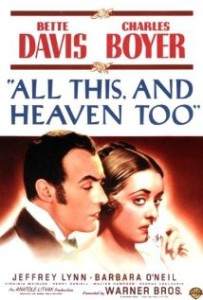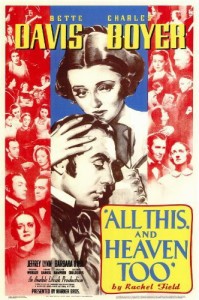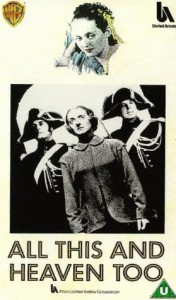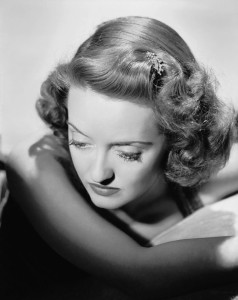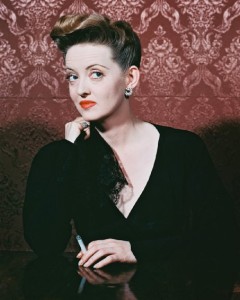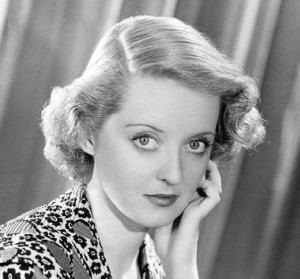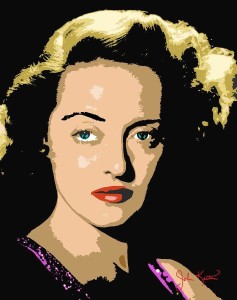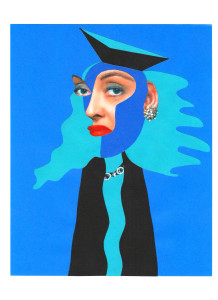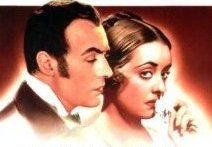All This, and Heaven Too **** (1940, Bette Davis, Charles Boyer, Jeffrey Lynn, Barbara O’Neil) – Classic Movie Review 2.741
Director Anatole Litvak’s 1940 period romantic drama film All This, and Heaven Too provides a gleaming, glorious showcase for Bette Davis, whose hits just came coming in this golden era for her.
Charles Boyer provides the perfect debonair romantic foil for her as French 1800s aristocrat Duc de Praslin, who falls for his attractive and virtuous children’s governess Henriette Deluzy-Desportes (Davis). Henriette does a sterling job, saving the family’s little son from a near-fatal illness and pleasing all the four children. June Lockhart plays one of the children in her second film and first credited role. She was the only one of the four to continue acting in to adulthood.
[Spoiler alert] But when the Duc’s insanely jealous estranged wife, the Duchesse de Praslin (Barbara O’Neil), dismisses Henriette, he kills her to get her out of the way.
Henriette Deluzy-Desportes must be Davis’s most exotic character name ever! Speaking in English tones, Davis is about as French as I am, but never mind, Boyer is the real thing.
Screen-writer Casey Robinson provides a long, involved and engrossing rendition of the Rachel Lyman Field bestseller, and it’s brought to vivid life on screen and handsomely filmed by Litvak, and strikingly shot by Ernest Haller. Alas, there’s no colour again – but never mind.
The always tending to be mannered Davis gives a surprisingly restrained and moving performance, and hers is matched by a meticulous and magnetic one by Boyer, though they were overlooked at Academy Awards time and it was O’Neil who was Oscar nominated. She lost to Jane Darwell in The Grapes of Wrath (1940). It was also nominated as Best Picture and for Best Cinematography.
The movie’s story is based on an actual scandal that rocked 19th-century France. French politician Duc de Choiseul-Praslin was accused of the brutal murder of his wife Fanny Sebastiani in 1848. Praslin committed suicide by poison while under house arrest, so the murder trial was annulled, but the murder remains one of France’s most famous unsolved cases.
Davis later – unfairly – complained that the film lacked spark and spontaneity because of Litvak’s over-meticulous planning: ‘Litvak had it all on paper; he planned every move. There is not the spontaneity or flexibility.’
It took her 40 minutes each day to dress in her historically accurate costumes with several layers of under garments and corsets. Her 37 costumes cost $1,000 each.
Warner Bros built a record 67 sets for the film, though the bed in the Duchesse’s bedroom is the one in Scarlett’s bedroom in Gone with the Wind (1939), in which Barbara O’Neil played Scarlett’s mother, borrowed from MGM. There are more than 150 paintings in the costly ($1,370,000) film, 70 per cent of whose budget went on set building and set decoration.
In the 1946 short Hollywood Daffy, a cartoon version of Davis enters the Warmer Bros lot talking to herself: ‘So, you say I’m mean to you. You say I’m mad, cruel, domineering. Well, you’re right. I’m all this, and heaven too.’
Also in the cast are Virginia Weidler, Jeffrey Lynn, Helen Westley, Henry Daniell, Harry Davenport, Walter Hampden, George Coulouris, Janet Beecher, Montagu Love, June Lockhart, Ann E Todd, Frank Reicher, Victor Kilian, Egon Brecher, Creighton Hale, Mary Forbes, Virginia Brissac, Georgia Caine and Natalie Moorhead.
The word ‘mademoiselle’ is spoken 615 times in the film, a Guinness World Record. Who counts these things? Was the screen-writer being paid by the word?
The original cut of the film was 190 minutes long but cut by 50 minutes with all the footage now missing. At 141 minutes, this is still Davis’s second longest film, after Mr Skeffington (1944).
The real life Henriette Deluzy-Deportes is an ancestor of book author Rachel Field. Henriette eventually married Henry Martyn Field (portrayed in the film by Jeffrey Lynn), Field’s great uncle.
© Derek Winnert 2015 Classic Movie Review 2,741
Check out more reviews on http://derekwinnert.com

